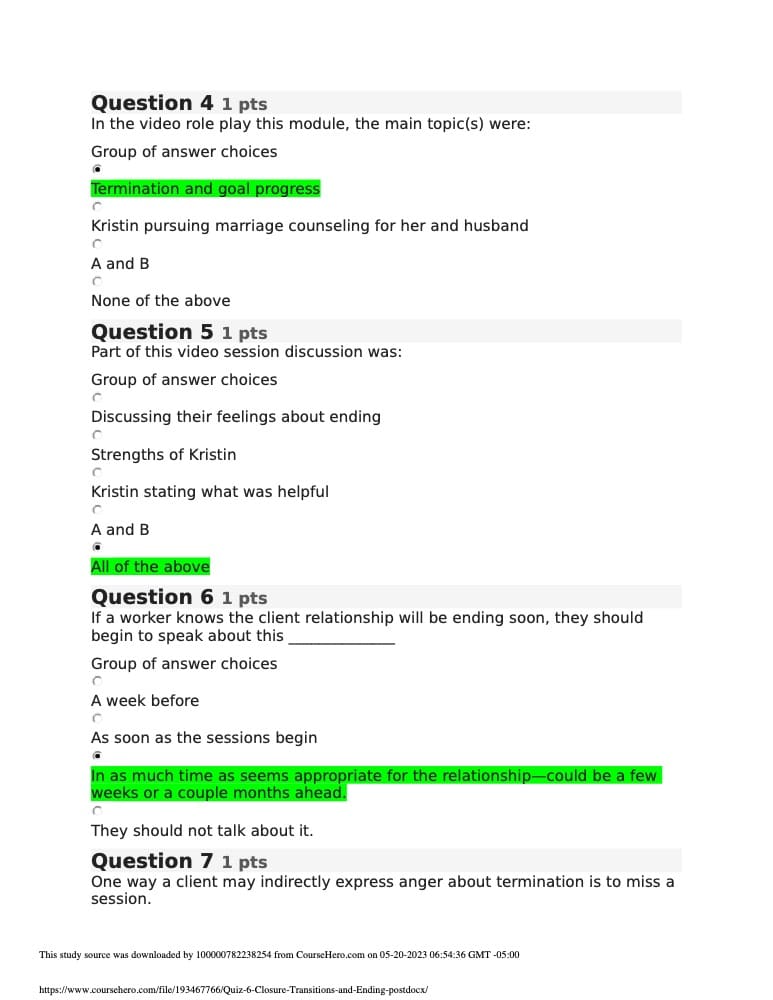SOWK 350 Quiz 6
SOWK 350 Quiz 6 Liberty University
SOWK 350 Quiz Closure, Transitions, and Ending
- The video role play included Jim encouraging Kristin’s strengths of:
- Jim, in the video, did well demonstrating the skill of all EXCEPT:
- The intervention technique used in the video clip was:
- In the video role play this module, the main topic(s) were:
- Part of this video session discussion was:
- If a worker knows the client relationship will be ending soon, they should begin to speak about this ______________
- One way a client may indirectly express anger about termination is to miss a session.
- In dealing with a trauma within an agency, the model which seems to be most effective for growth and healing amongst workers includes:
- The “farewell party” that could occur in this phase relates to:
- One main danger of the ending phase is:
- All of the following are important for endings in session EXCEPT:
- A worker and client discuss in their last two session how the client’s future will include developing healthy relationships. This describes:
- Evaluating the helping process with a client is important because:
- An honest exploration of what went well in the client-worker sessions, as well as what went poorly, is important in the ending process.
- A worker has to terminate the client relationship because they are being transferred to another position. They met with this client for 3 sessions and the client was passive, and though agreeable, not much was accomplished. This is an example of:
- When feelings about endings are avoided, it is called:
- An agenda for future work is about finishing up old issues and developing new dreams.
- At the end of a solid working experience, both client and worker will likely both experience all of the following, BUT
- Giving and receiving feedback is important:
- Unexpected death or the suicide of a client can impact more than just the worker, it can have an effect on the colleagues around them.
Set 2
- The intervention technique used in the video clip was:
- In the video role play this module, the main topic(s) were:
- The video role play included Jim encouraging Kristin’s strengths of:
- Part of this video session discussion was:
- Jim, in the video, did well demonstrating the skill of all EXCEPT:
- A worker has to terminate the client relationship because they are being transferred to another position. They met with this client for 3 sessions and the client was passive, and though
- Unexpected death or the suicide of a client can impact more than just the worker, it can have an effect on the colleagues around them.
- Giving and receiving feedback is important:
- The “farewell party” that could occur in this phase relates to:
- At the end of a solid working experience, both client and worker will likely both experience all of the following, BUT
- An agenda for future work is about finishing up old issues and developing new dreams.
- An honest exploration of what went well in the client-worker sessions, as well as what went poorly, is important in the ending process.
- In dealing with a trauma within an agency, the model which seems to be most effective for growth and healing amongst workers includes:
- Evaluating the helping process with a client is important because:
- A worker and client discuss in their last two session how the client’s future will include developing healthy relationships. This describes:
- When feelings about endings are avoided, it is called:
- If a worker knows the client relationship will be ending soon, they should begin to speak about this
- All of the following are important for endings in session EXCEPT:
- One main danger of the ending phase is:
- One way a client may indirectly express anger about termination is to miss a session.
Set 2
- In the video role play this module, the main topic(s) were:
- One way a client may indirectly express anger about termination is to miss a session.
- The intervention technique used in the video clip was:
- All of the following are important for endings in session EXCEPT:
- Giving and receiving feedback is important:
- Jim, in the video, did well demonstrating the skill of all EXCEPT:
- The “farewell party” that could occur in this phase relates to:
- Part of this video session discussion was:
- If a worker knows the client relationship will be ending soon, they should begin to speak about this ______________
- Unexpected death or the suicide of a client can impact more than just the worker, it can have an effect on the colleagues around them.
- The video role play included Jim encouraging Kristin’s strengths of:
- An honest exploration of what went well in the client-worker sessions, as well as what went poorly, is important in the ending process.
- In dealing with a trauma within an agency, the model which seems to be most effective for growth and healing amongst workers includes:
- An agenda for future work is about finishing up old issues and developing new dreams.
- At the end of a solid working experience, both client and worker will likely both experience all of the following, BUT __________________:
- One main danger of the ending phase is:
- Evaluating the helping process with a client is important because:
- A worker and client discuss in their last two session how the client’s future will include developing healthy relationships. This describes:
- When feelings about endings are avoided, it is called:
- A worker has to terminate the client relationship because they are being transferred to another position. They met with this client for 3 sessions and the client was passive, and though agreeable, not much was accomplished. This is an example of:
